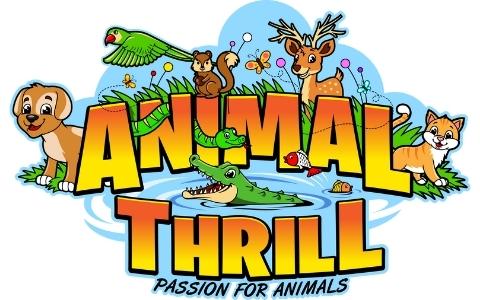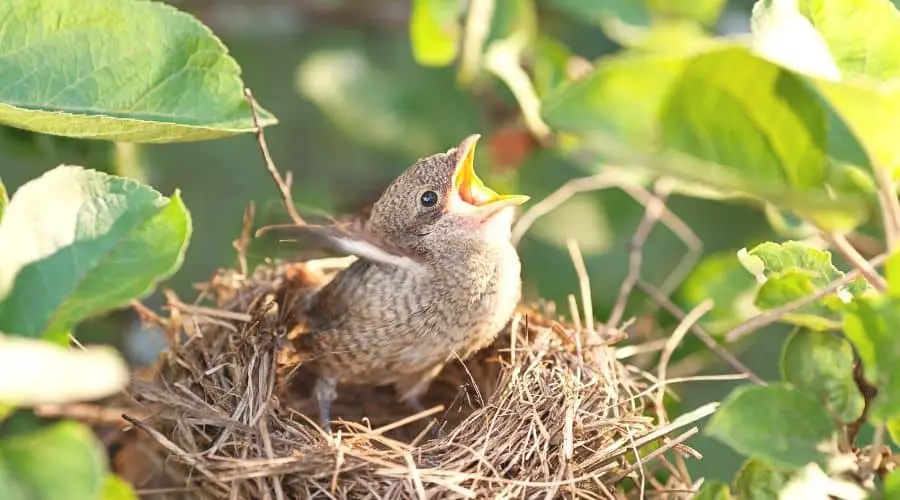Most living creatures, birds included, need water much more than food, so they will live longer with a source to drink from. In nature, parent birds may feed their young as often as every two to three hours, and sometimes they feed babies overnight.
Luckily for the adults, as the babies grow, they eat less often. How long can a baby bird go without food?
Birds usually eat and drink at least one or two times per day, but babies are fed more often about every 3-4 hours. A baby bird can only go without food or water for as long as 24 hours. If the baby bird has water to drink, it will last a bit longer without food, but only a few hours.
Table of Contents
How Long Can A Bird Survive Without Food or Water
A handful of factors affect how long a bird can survive without food and water. For example, species can make a big difference. While most adult birds will last around two days at most, but it depends on the circumstances.
A bird in a temperate climate that ate and drank well just before they lost access to food and water will certainly make it for longer than one that only had a few bites to eat.
Regular large meals and fat stores also increase the time limit since the bird will have calories to spare. Large species can sometimes last several days or longer. Sadly, some species don’t last very long at all.
According to Hummingbird Guide, “Hummingbirds live on the edge of survival and can starve to death in 3 to 5 hours… Hummingbirds digest their food in 20 minutes with great efficiency. They extract more than 90% of the sucrose and eliminate the water. If you have ever watched a hummingbird perch, you now know that they are not resting but busy digesting food.”
How Long Can Birds Go Without Food
When in doubt, it’s safe to assume that an average bird can only go a day or two without food. However, the smaller a bird, the less energy it can store, so it won’t make it as long.
Oversize birds like ostriches and emu will last longer, but so will species that take longer to metabolize their food, such as owls and penguins.
How Long Can Lovebirds Go Without Food
Lovebirds need to be fed at least once per day. They’ll eat 1 1/2 to 2 ounces (45-60 grams) of seed or other foods.
Wild lovebirds eat berries, corn, figs, fruits, grains, grasses, leaf buds, and seeds, but you can buy premade food for lovebirds at most pet stores.
While they can survive a couple of days without food, it’s likely to cause health problems if they have to wait any longer than that.
How Many Days Can A Bird Live Without Water
Some desert birds get water from their food or drink less than their peers. However, typical birds all have similar metabolisms.
Regrettably, that means most birds last about a day without water, and far less if it’s hot or they have to be very active. Birds don’t drink like mammals, but they still need water.
According to Birdwatchers’ Digest, “Most birds drink some water every day… (they) lap water into their bill, akin to the way cats and dogs drink. But then birds must tilt their head to swallow. Swifts and swallows skim a bill full of water as they fly over lakes, ponds, and rivers.”
How Long Can A Wild Baby Bird Go Without Food
Wild baby birds don’t have any particular advantages over domestic birds when it comes to surviving without food. A wild baby bird will last a day or two with nothing to eat.
If they fall from the nest, a wild bird’s mother or father will often pick them up and put them back in the tree, but you can do this too if you find a bird near its nest.
Contrary to the myth, adults will not abandon their babies simply because a human touched them.
How Many Days Can A Baby Bird Go Without Food
Most baby birds will only make it about a day without food. At most, they could last for two days.
However, starvation at a young age is likely to cause lasting health problems and lower their overall quality of life. Sadly, it can also interfere with a baby bird’s growth and may result in developmental issues.
If you find an abandoned wild bird, please do not disturb the nest as this is illegal. Instead, you can stick around at a safe distance and make sure the bird is truly abandoned.
Most of the time, a parent is nearby or out getting food. If the baby is positively orphaned, you can contact a licensed bird rehabilitator.
How Long Can Baby Robins Go Without Food
Robins share parenting duties, so two adults usually tend the nest. However, if one partner dies, then a widow or widower may be left alone to manage the nest, so the babies look abandoned when they go out to get food.
That said, a robin nestling can last around twenty-four hours without food.
Robins under two weeks will almost always perish without a parent to feed them. Since these birds don’t eat seeds and nuts, they require a parent or specialist to provide them ground up invertebrates like worms.
How Long Can A Baby Pigeon Go Without Food
Pigeons need to be fed at least daily, if not more often. However, grown pigeons can store fat well and eat heartily, consuming 12-20 percent of their body weight each day.
As a result of these habits, adult pigeons survive longer than other birds without food and water.
Plus, pigeons are infamous scavengers who will eat anything from insects to seeds and grains or even human garbage, depending on where they live.
Sadly, until the babes grow up and store some fat, they won’t last any longer than other baby birds.
Helpful Tips To Know About How Long A Baby Bird Can Go Without Food
Usually, birds eat and drink at least one or two times per day, but babies are fed more often. Surviving without food or water quickly becomes uncomfortable and dangerous for them. After a day or two, baby birds can die of starvation.
Here are more helpful tips to know about how long a baby bird can go without food.
- Mammals pee out excess water and unnecessary vitamins through their urethra. Birds don’t have a urethra or an anus. Instead, they have a cloaca which works as an all-purpose exit for feces, liquids, and even eggs if the bird is female.
- Birds don’t need as much water as mammals because they don’t have sweat glands. Although avians lose water from respiration and droppings, they only need to replace it a couple of times per day.
- A bird can become severely dehydrated without dying. However, dehydration can cause other issues within their delicate bodies and is likely to shorten the birds’ life expectancy.
Final Thoughts
Baby birds can’t go very long without food. Parent-birds usually feed their young every two to four hours, and some even feed babies at night like human children.
Well-fed hatchlings will last hours longer than their starving companions. Luckily, baby birds grow quickly, and as they age, they will start to eat less frequently.
Eventually, all baby birds grow feathers and learn to fly and feed themselves as long as they had enough to eat when they were small and helpless.


